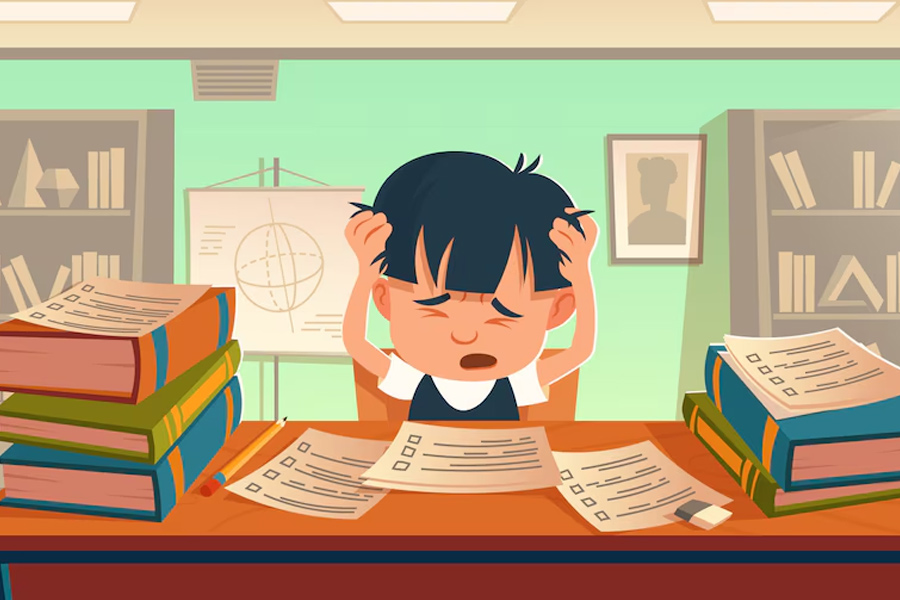
Exams are a significant source of stress for students of all ages. The pressure to perform well, retain large amounts of information, and meet high expectations can lead to anxiety, sleep disturbances, and even burnout. However, managing stress effectively can improve focus, boost memory, and enhance overall well-being. If you’re feeling overwhelmed during exams, a simple mantra can help: Breathe, Stretch, Write, and Repeat.
Table of Content:-
CHECK YOUR
MENTAL HEALTH

The Science Behind Exam Stress
Exam stress triggers the body's fight-or-flight response, increasing cortisol levels, heart rate, and muscle tension. While short-term stress can enhance performance, chronic stress can negatively impact cognitive function and mental health. A study published in Frontiers in Psychology (2019) found that excessive academic stress is linked to anxiety, depression, and decreased learning capacity in students. This highlights the importance of adopting stress-management techniques to maintain balance during exam periods.
Breathe: The Power of Deep Breathing

Breathing exercises are a proven method to reduce stress and anxiety. Deep breathing activates the parasympathetic nervous system, promoting relaxation and lowering cortisol levels. A 2021 study in The Journal of Clinical Psychology found that students who practised diaphragmatic breathing for five minutes before an exam experienced lower anxiety and improved cognitive performance.
Try the 4-7-8 breathing technique:
- Inhale deeply through your nose for four seconds.
- Hold your breath for seven seconds.
- Exhale slowly through your mouth for eight seconds.
- Repeat for five cycles.
This method calms the nervous system, sharpens focus, and enhances emotional regulation, making it an excellent tool for exam preparation.
Also read: Are Your Split Nails a Sign of Anxiety? Here Is How Stress Cause Nails To Split
Stretch: The Link Between Movement and Memory

Physical activity is a natural stress reliever, and even simple stretching can make a difference. Stretching improves circulation, reduces muscle tension, and releases endorphins – the body's natural mood boosters. A study published in The Journal of Educational Psychology (2020) found that students who engaged in light physical activity, such as stretching or yoga, during study breaks demonstrated better concentration and memory retention.
Try these quick exam-friendly stretches:
- Neck rolls: Gently roll your head in a circular motion to release neck tension.
- Shoulder shrugs: Lift your shoulders toward your ears and drop them back down.
- Seated forward bend: Stretch your arms forward while sitting to ease lower back strain.
Incorporating a few minutes of stretching between study sessions can reduce fatigue and improve mental clarity.
Write: Journaling to Manage Exam Anxiety

Writing is a therapeutic practice that can help organise thoughts, release stress, and enhance learning. Studies suggest that expressive writing reduces exam-related anxiety by allowing students to process their emotions. Research from Applied Cognitive Psychology (2022) showed that students who wrote about their worries before an exam performed better than those who didn’t.
How to use writing for stress relief:
- Brain dump: Write down everything on your mind to clear mental clutter.
- Gratitude list: Focus on positive aspects of your learning journey.
- Study reflection: Summarise what you've learned to reinforce understanding.
Writing helps shift focus from stress to productivity, making it a valuable tool for exam preparation.
Repeat: The Importance of Consistency
The key to managing exam stress is consistency. Implementing these strategies regularly can build resilience and create a balanced study routine. Here’s a simple exam stress-relief plan:
Before studying – Start with deep breathing to calm your mind.
During study breaks – Stretch for five minutes to stay relaxed and energised.
Before bed – Write in a journal to declutter thoughts and improve sleep.
Repeat daily – Turn these techniques into habits for long-term benefits.
Conclusion
Exams may be stressful, but you don’t have to let stress take over. By incorporating breathing exercises, stretching, and writing into your routine, you can enhance focus, reduce anxiety, and improve overall performance. So, the next time you feel overwhelmed, remember: Breathe, Stretch, Write, and Repeat.
Also watch this video
How we keep this article up to date:
We work with experts and keep a close eye on the latest in health and wellness. Whenever there is a new research or helpful information, we update our articles with accurate and useful advice.
Current Version